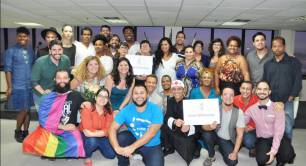Good Leaders Podcast Episode 14 – Sebastian Rocca: ‘The magic happens when you create uncomfortable, unconventional partnerships’
Sebastian Rocca, founder and CEO of social enterprise Micro Rainbow, opens up to Tim West about what Pride Month means to him, growing up gay in Catholic Italy, the importance of understanding who your allies are and embracing vulnerability in leadership.
Love podcasts? Don't miss out on ours! Catch up on all our podcasts and subscribe free on Apple Podcasts, Spotify or Soundcloud.
“In Brazil, an LGBTQI person is murdered every 17 hours,” says Sebastian Rocca, founder and CEO of Micro Rainbow. This harrowing statistic is just one of many that prompted him to create a “solution” for LGBTQI people fleeing persecution around the world.
Micro Rainbow is a social enterprise headquartered in London that supports LGBTQI asylum seekers and refugees by providing them with safe housing and access to employment, training and education. Sebastian says: “When they come to the UK they’re still not safe. They’re often housed by the government in places that are shared with other people that come from the same countries.”
After receiving a £4m investment three years ago from six social investors, including the Joseph Rowntree Foundation and Barrow Cadbury Trust, Micro Rainbow has since gone on to buy 22 safe houses for LGBTQI asylum seekers in the UK.
While Sebastian started Micro Rainbow's work as “a labour of love”, the business has grown to encompass a team of around 20 employees and approximately 50 volunteers globally, supporting more than 7,000 vulnerable LGBTQI people in the last 10 years. Its sister organisation, Micro Rainbow International Foundation, supports LBTQI people living in poverty in countries like Brazil and Cambodia.
According to Sebastian, Micro Rainbow supports around 1,000 LGBTQI migrants a year in the UK to find safety. To measure its impact effectively, the social enterprise collects its data from its beneficiaries. “It’s fascinating the amount of feedback that we receive. It’s not rocket science; when you ask people directly, you get very rich data,” he says.
However, Micro Rainbow doesn’t just use data to measure its impact. It also uses data as a management tool. To determine whether the business is achieving its impact goals, Sebastian and his team use different indicators for the three programmes they provide: housing, social inclusion and employability. He says: “For example, when it comes to housing, an indicator is increased safety for LGBTQI asylum seekers. When it comes to employability, one of the indicators is increased independence. Each programme is packed with a variety of indicators that will tell us if we are making progress towards our theory of change.”
Pride Month as a time for reflecting and “building uncomfortable partnerships”
For Sebastian, LGBT Pride Month in June is a “month of reflection”: “It’s a month that, yes, I use to appreciate good things that have happened. But unfortunately, there is still a need to remember that life for LGBTQI people is tough and could mean violence and death in some countries.”
Sebastian also addresses how some corporations in the private sector use Pride Month as a way to “pinkwash” their brands and make money, noting: “I’m always surprised when I see how much commitment there can be from corporations during Pride Month.”
Nevertheless, “the bottom line” he says, is that these private corporations “exist and they have power”. “By connecting with the right people, we can actually build strong partnerships. I think that’s where the magic happens… when you create uncomfortable, unconventional partnerships that might not have existed a few years ago,” he says. “For Micro Rainbow, it’s about understanding who our allies are and how we can work together to create change.”
Tim West talks to Sebastian about:
- How embracing the social enterprise model in the Global North can help make LGBTQI-focused charities in the Global South more sustainable
- Why his biggest flaw as a social entrepreneur was mistaking endurance for resilience
- How having parents who were business owners instilled an entrepreneurial “instinct” in him
- His concerns about the effects of the UK’s ‘hostile environment’ and the Safety of Rwanda Act on LGBTQI migrants
The power of vulnerability in leadership
A quality Sebastian has grown to appreciate in leaders is vulnerability. He says: “I never thought I would say that the quality of a good leader is being vulnerable. I felt that to be a leader you need to be tough… you need to give the impression that you have everything under control.”
Modelling vulnerability in leadership roles can allow you to bring your whole self to the position
He used to struggle with delegating tasks to his employees. “I wasn't allowing myself to be vulnerable with my team by saying: ‘Hey, I need some help here.’” Now, he realises that “modelling vulnerability in leadership roles can open up the opportunity for authenticity” and allow you to “bring your whole self to the leadership position”.
This, he says, is the reason why Jacinda Ardern, former prime minister of New Zealand, is his favourite leader. “She was not afraid to share that she had to do the school run and at the same time meet other heads of state, being vocal about also her own challenges as a mother and a leader,” he says, adding: “For me, that’s very beautiful because it’s really role playing authenticity in a leadership position without fear of backlash.”
- Read Jacinda Ardern’s reflections on leadership at Skoll 2024: ‘Hope dies when we lose our sense of expectation’
The most vulnerable point in Sebastian’s life gave him the drive to make a career out of his sexuality, he says, recalling how he was bullied by his schoolmates and teachers at a Catholic high school in Italy: “This led to a deep sense of low self-esteem, which I tackled many years later through coaching and therapy.” Now, he has built an extensive career dedicated to helping queer people live their lives authentically. “I couldn’t be more out if I tried,” he says, laughing.
What does the future hold for Micro Rainbow? Eradicating the homelessness of LGBTQI asylum seekers in the UK by 2030, Sebastian hopes. He plans to achieve this through a second round of investment, which will enable the organisation to double the number of safe houses that the social enterprise owns across the country and “meet the full demand for safe housing in the UK”.
“What’s really exciting for us,” he says, “is that it would be quite rare for a third sector organisation to have identified an issue, come up with a solution, and scaled and replicated to the point that it has met the full demand for that social issue.”
Thanks for reading Pioneers Post. As an entrepreneur or investor yourself, you'll know that producing quality work doesn't come free. We rely on our subscribers to sustain our journalism – so if you think it's worth having an independent, specialist media platform that covers social enterprise stories, please consider subscribing. You'll also be buying social: Pioneers Post is a social enterprise itself, reinvesting all our profits into helping you do good business, better.




